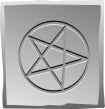 Wicca
is a common and much older name for witchcraft. The term witchcraft has been
defined in different ways. In the past it has most often referred to the
human harnessing of supernatural powers for the malevolent purpose of
practicing black magic. For this reason, witchcraft, sorcery, and magic are
nearly synonymous. Witchcraft is not, however, synonymous with Satanism. Not
all witches worship Satan, and in fact most do not believe in Satan at all.
Nor do they believe in hell, evil, or original sin. These groups believe that
Satan is an imaginary creation of the Christian Church. If they believe in
Satan at all they will tell you that the devil is just another Christian deity.
They also do not believe in demons, and their deities are considered to be
"imminent", or within each of us, meaning that everyone is actually deity.
Wicca
is a common and much older name for witchcraft. The term witchcraft has been
defined in different ways. In the past it has most often referred to the
human harnessing of supernatural powers for the malevolent purpose of
practicing black magic. For this reason, witchcraft, sorcery, and magic are
nearly synonymous. Witchcraft is not, however, synonymous with Satanism. Not
all witches worship Satan, and in fact most do not believe in Satan at all.
Nor do they believe in hell, evil, or original sin. These groups believe that
Satan is an imaginary creation of the Christian Church. If they believe in
Satan at all they will tell you that the devil is just another Christian deity.
They also do not believe in demons, and their deities are considered to be
"imminent", or within each of us, meaning that everyone is actually deity.
A few groups do, however, worship Satan. During the Middle Ages, witchcraft experienced a great revival. The supernatural became very popular and superstition abounded. If someone wanted to become a witch, there was an initiation process. Some of the techniques were simple and some were complicated, but there were usually two requirements. The first was that the would-be witch must join of his or her own free will. The second requirement was that the prospective witch must be willing to worship the devil. Modern day witches, however, are not typically Satan worshipers.
Much like the New Age Movement, most Wiccans do not accept the belief that there is good or evil. They argue that there are only forces that must be balanced. Evil is just a necessary part of good and the negative can be transmuted into the positive (a basic belief of medieval alchemy). While political views are not universal among witches, most support neo-tolerance. There is no absolute truth. What's true for you may not be true for me, so everything is true, just pick one. They also are strong supporters of women's rights and matriarchy, sexual "freedom" (including homosexuality, polyandry, non-monogamy, sexual activity by teens), abortion, and the abolition of Christianity from public life, especially in schools and governmental functions. In recent years there have been lawsuits filed by Pagans against such things as "In God We Trust", student-led prayer in schools, the Ten Commandments, and Christian symbols, such as the Cross, in city and county seals. However, many are also active in getting the schools to teach the Wiccan holidays (Halloween, Winter Solstice, etc.), pagan elements of "Earth Day", and Pagan symbolism. An ally in the fight to introduce pagan earth worship into the schools is found in the United Nations as they are working to promote the Earth Charter in education, a document that contains much pagan tradition and doctrine.
Modern day Wiccans tend to distance themselves from Christianity because of what they claim is the proliferation of a patriarchal male-dominated religion that has historically ignored the role of women in the church and society. Traditionally, however, there have been as many, if not more, male witches/sorcerers than female in some pagan circles (e.g., the Druids). While not a religion for women only, today witchcraft is very much a female dominated religion.
The definitive start of the modern witchcraft era began with Gerald Gardner (1884-1964). As an archaeologist, Gardner had accumulated an extensive occult background. While in Southeast Asia, he learned the secrets of the Malaysian magical knife and became a Mason and a nudist. In 1939 when he returned to England an avid occultist, he became a member of the Corona Fellowship of Rosicrucians where he met Dorothy Clutterbuck. Clutterbuck initiated Gardner into witchcraft. Gordon wrote two books, one of which he claimed was to record accurately the history and practice of witchcraft, as he felt it was dying out. J. Gordon Melton stated in his review of Gardner's book Witchcraft Today, "Research suggests that Gardner did not discover a pre-existing Witchcraft group". A paper by Gardner published by Ripley's Believe it or Not disclosed that Gardner took the magical resources he acquired in Asia and a selection of Western magical texts and created a new religion centered upon the worship of the Mother-Goddess."
This was an important beginning in witchcraft, for it is the worship of the Mother-Goddess that has become the focus of modern witchcraft. From Gardner's writings, greatly influenced by Aleister Crowley, Theosophy, Freemasonry, ritual/sex magic, and numerous other occult sources, emerged modern day Wicca.

